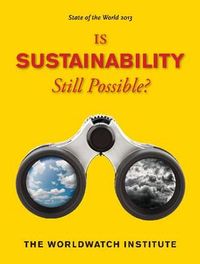
spara 75%
1 säljare
State of the World 2013
Every day, we are presented with a range of "sustainable" products and activities-from "green" cleaning supplies to carbon offsets - but with so much labelled as "sustainable," the term has become essentially sustainable, at best indicating a practice or product slightly less damaging than the conventional alternative. Is it time to abandon the concept altogether, or can we find an accurate way to measure sustainability? If so, how can we achieve it? And if not, how can we best prepare for the coming ecological decline? In the latest edition of "Worldwatch Institute's State of the World" series, scientists, policy experts, and thought leaders tackle these questions, attempting to restore meaning to sustainability as more than just a marketing tool. In "State of the World 2013: Is Sustainability Still Possible?", experts define clear sustainability metrics and examine various policies and perspectives, including geo-engineering, corporate transformation, and changes in agricultural policy, that could put us on the path to prosperity without diminishing the well-being of future generations. If these approaches fall short, the final chapters explore ways to prepare for drastic environmental change and resource depletion, such as strengthening democracy and societal resilience, protecting cultural heritage, and dealing with increased conflict and migration flows. "State of the World 2013" cuts through the rhetoric surrounding sustainability, offering a broad and realistic look at how close we are to fulfilling it today and which practices and policies will steer us in the right direction.
Utgiven: 2013
ISBN: 9781610914499
Förlag: Island Press
Format: Häftad
Språk: Engelska
Sidor: 464 st
Every day, we are presented with a range of "sustainable" products and activities-from "green" cleaning supplies to carbon offsets - but with so much labelled as "sustainable," the term has become essentially sustainable, at best indicating a practice or product slightly less damaging than the conventional alternative. Is it time to abandon the concept altogether, or can we find an accurate way to measure sustainability? If so, how can we achieve it? And if not, how can we best prepare for the coming ecological decline? In the latest edition of "Worldwatch Institute's State of the World" series, scientists, policy experts, and thought leaders tackle these questions, attempting to restore meaning to sustainability as more than just a marketing tool. In "State of the World 2013: Is Sustainability Still Possible?", experts define clear sustainability metrics and examine various policies and perspectives, including geo-engineering, corporate transformation, and changes in agricultural policy, that could put us on the path to prosperity without diminishing the well-being of future generations. If these approaches fall short, the final chapters explore ways to prepare for drastic environmental change and resource depletion, such as strengthening democracy and societal resilience, protecting cultural heritage, and dealing with increased conflict and migration flows. "State of the World 2013" cuts through the rhetoric surrounding sustainability, offering a broad and realistic look at how close we are to fulfilling it today and which practices and policies will steer us in the right direction.
Begagnad bok
145 kr580 krSpara 435 kr (75%) mot nypris
Fri frakt & skickas inom 1-3 vardagar
Köpskydd med Studentapan
Varje köp täcks av Studentapans köpskydd som säkerställer att boken kommer fram, att du får rätt bok och att skicket stämmer överens med beskrivning.



